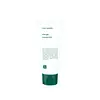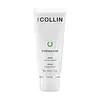What's inside
What's inside
 Key Ingredients
Key Ingredients

 Benefits
Benefits

 Concerns
Concerns

 Ingredients Side-by-side
Ingredients Side-by-side

Water
Skin ConditioningCentella Asiatica Extract
CleansingButylene Glycol
HumectantGlycerin
HumectantDimethicone
EmollientHydroxyethyl Acrylate/Sodium Acryloyldimethyl Taurate Copolymer
Emulsion Stabilising1,2-Hexanediol
Skin ConditioningCetyl Alcohol
EmollientCetearyl Olivate
Sorbitan Olivate
EmulsifyingCaprylhydroxamic Acid
Stearyl Alcohol
EmollientAllantoin
Skin ConditioningBetaine
HumectantPanthenol
Skin ConditioningPolysorbate 60
EmulsifyingXanthan Gum
EmulsifyingSorbitan Isostearate
EmulsifyingMyristyl Alcohol
EmollientMelaleuca Alternifolia Leaf Oil
AntioxidantEucalyptus Globulus Leaf Oil
PerfumingLauryl Alcohol
EmollientPantolactone
HumectantSodium Hyaluronate
HumectantWater, Centella Asiatica Extract, Butylene Glycol, Glycerin, Dimethicone, Hydroxyethyl Acrylate/Sodium Acryloyldimethyl Taurate Copolymer, 1,2-Hexanediol, Cetyl Alcohol, Cetearyl Olivate, Sorbitan Olivate, Caprylhydroxamic Acid, Stearyl Alcohol, Allantoin, Betaine, Panthenol, Polysorbate 60, Xanthan Gum, Sorbitan Isostearate, Myristyl Alcohol, Melaleuca Alternifolia Leaf Oil, Eucalyptus Globulus Leaf Oil, Lauryl Alcohol, Pantolactone, Sodium Hyaluronate
Water
Skin ConditioningIsodecyl Laurate
EmollientTallow Acid
CleansingCetyl Alcohol
EmollientButylene Glycol
HumectantOlea Europaea Oil Unsaponifiables
Skin ConditioningStearyl Alcohol
EmollientC15-19 Alkane
SolventPanthenol
Skin ConditioningGlycine Soja Oil Unsaponifiables
EmollientTriticum Vulgare Germ Oil Unsaponifiables
EmollientGlycine Soja Sterols
EmollientPhytosteryl/Octyldodecyl Lauroyl Glutamate
Skin ConditioningTocopheryl Linoleate/Oleate
AntioxidantIsodecyl Salicylate
Skin ConditioningHydrolyzed Rice Bran Protein
Skin ConditioningSodium Hyaluronate
HumectantPollen Extract
EmollientMethylsilanol Mannuronate
Skin ConditioningChlorphenesin
AntimicrobialPotassium Sorbate
PreservativePentylene Glycol
Skin ConditioningTocopherol
AntioxidantHydroxyethyl Acrylate/Sodium Acryloyldimethyl Taurate Copolymer
Emulsion StabilisingMethylpropanediol
SolventBenzyl Salicylate
PerfumingTriethanolamine
BufferingParfum
MaskingDisodium EDTA
PEG-5 Pentaerythrityl Ether
EmollientPPG-5 Pentaerythrityl Ether
EmollientAcacia Senegal Gum
MaskingXanthan Gum
EmulsifyingPolysorbate 60
EmulsifyingSorbitan Isostearate
EmulsifyingBHT
AntioxidantWater, Isodecyl Laurate, Tallow Acid, Cetyl Alcohol, Butylene Glycol, Olea Europaea Oil Unsaponifiables, Stearyl Alcohol, C15-19 Alkane, Panthenol, Glycine Soja Oil Unsaponifiables, Triticum Vulgare Germ Oil Unsaponifiables, Glycine Soja Sterols, Phytosteryl/Octyldodecyl Lauroyl Glutamate, Tocopheryl Linoleate/Oleate, Isodecyl Salicylate, Hydrolyzed Rice Bran Protein, Sodium Hyaluronate, Pollen Extract, Methylsilanol Mannuronate, Chlorphenesin, Potassium Sorbate, Pentylene Glycol, Tocopherol, Hydroxyethyl Acrylate/Sodium Acryloyldimethyl Taurate Copolymer, Methylpropanediol, Benzyl Salicylate, Triethanolamine, Parfum, Disodium EDTA, PEG-5 Pentaerythrityl Ether, PPG-5 Pentaerythrityl Ether, Acacia Senegal Gum, Xanthan Gum, Polysorbate 60, Sorbitan Isostearate, BHT
 Reviews
Reviews

Ingredients Explained
These ingredients are found in both products.
Ingredients higher up in an ingredient list are typically present in a larger amount.
Butylene Glycol (or BG) is used within cosmetic products for a few different reasons:
Overall, Butylene Glycol is a safe and well-rounded ingredient that works well with other ingredients.
Though this ingredient works well with most skin types, some people with sensitive skin may experience a reaction such as allergic rashes, closed comedones, or itchiness.
Learn more about Butylene GlycolCetyl Alcohol is a fatty alcohol. Fatty Alcohols are most often used as an emollient or to thicken a product.
Its main roles are:
Though it has "alcohol" in the name, it is not related to denatured alcohol or ethyl alcohol.
The FDA allows products labeled "alcohol-free" to have fatty alcohols.
Learn more about Cetyl AlcoholThis is a synthetic polymer. It helps improve the texture of products by adding thickness and gel-like feel.
It is also an emulsifer, meaning it prevents ingredients such as oil and water from separating. It also helps evenly disperse other ingredients.
Panthenol is a common ingredient that helps hydrate and soothe the skin. It is found naturally in our skin and hair.
There are two forms of panthenol: D and L.
D-panthenol is also known as dexpanthenol. Most cosmetics use dexpanthenol or a mixture of D and L-panthenol.
Panthenol is famous due to its ability to go deeper into the skin's layers. Using this ingredient has numerous pros (and no cons):
Like hyaluronic acid, panthenol is a humectant. Humectants are able to bind and hold large amounts of water to keep skin hydrated.
This ingredient works well for wound healing. It works by increasing tissue in the wound and helps close open wounds.
Once oxidized, panthenol converts to pantothenic acid. Panthothenic acid is found in all living cells.
This ingredient is also referred to as pro-vitamin B5.
Learn more about PanthenolPolysorbate 60 is used to help stabilize products. It is a surfactant and emulsifier. These properties help keep ingredients together in a product. Surfactants help reduce surface tension between ingredients with different states, such as liquids and solids. Emulsifiers help prevent oils and waters from separating.
Polysorbate 60 is sorbitol-based and created from the ethoxylation of sorbitan. Ethoxylation is a chemical reaction used to add ethylene oxide. Sorbitan is a the dehydrated version of sorbitol, a sugar found in fruits.
In this case, the 60 comes from reacting 60 units of ethylene oxide with sorbitan.
Polysorbates are commonly used in medicine and foods.
Learn more about Polysorbate 60Sodium Hyaluronate is hyaluronic acid's salt form. It is commonly derived from the sodium salt of hyaluronic acid.
Like hyaluronic acid, it is great at holding water and acts as a humectant. This makes it a great skin hydrating ingredient.
Sodium Hyaluronate is naturally occurring in our bodies and is mostly found in eye fluid and joints.
These are some other common types of Hyaluronic Acid:
Learn more about Sodium HyaluronateSorbitan Isostearate is an emulsifer and cleaning agent. It is created from isostearic acid and sorbitol.
As an emulsifier, Sorbitan Isostearate prevents oils and water from separating.
Due to its isostearic acid base, it may not be safe for Malassezia or fungal acne.
Learn more about Sorbitan IsostearateStearyl Alcohol is a type of fatty alcohol from stearic acid. It is a white, waxy compound used to emulsify ingredients.
Fatty Alcohols are most often used as an emollient or to thicken a product. Emollients help soothe and hydrate the skin by trapping moisture.
They are usually derived from natural fats and oils and therefore do not have the same drying or irritating effect as solvent alcohols. FDA allows products labeled "alcohol-free" to have fatty alcohols.
Learn more about Stearyl AlcoholWater. It's the most common cosmetic ingredient of all. You'll usually see it at the top of ingredient lists, meaning that it makes up the largest part of the product.
So why is it so popular? Water most often acts as a solvent - this means that it helps dissolve other ingredients into the formulation.
You'll also recognize water as that liquid we all need to stay alive. If you see this, drink a glass of water. Stay hydrated!
Learn more about WaterXanthan gum is used as a stabilizer and thickener within cosmetic products. It helps give products a sticky, thick feeling - preventing them from being too runny.
On the technical side of things, xanthan gum is a polysaccharide - a combination consisting of multiple sugar molecules bonded together.
Xanthan gum is a pretty common and great ingredient. It is a natural, non-toxic, non-irritating ingredient that is also commonly used in food products.
Learn more about Xanthan Gum